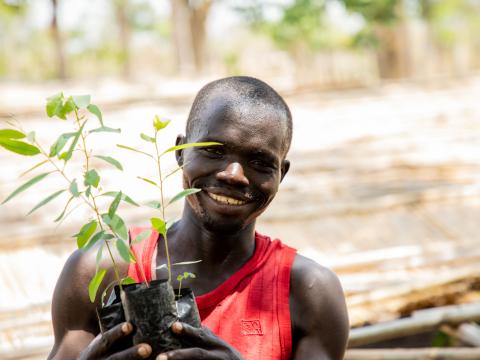A family invests in tree planting to fight climate change

“We sat as a family some years back and decided to invest in trees. We agreed to plant trees on 50 acres of land so that our children and grandchildren would go to school. Altogether, we planted 27,000 seedlings”, narrates William Manga (34), a resident of Kulukulu village, Ukusijoni sub-county, Ayiri parish.
Even with a better and secured future for the children of Manga and his five siblings, the increasing population of refugees has continued to assert pressure on the environment, especially within hosting districts. Adjumani district, where Manga lives, hosts 245,071 refugees out of the 1,582,076 in Uganda.
With World Vision's Uganda Refugee Response transitioning from food and cash handouts, we are implementing a project to improve resilience and livelihood security for 25,225 households in Adjumani district by September 2023. World Vision's Australia Office is funding the project.
Currently, the project is empowering 30 groups both in the settlements and host communities. These groups are involved in different activities, including seedling regeneration, tree planting, environmental protection, and Savings for Transformation. Manga is a member of Aridha village loans and savings association group, established in 2019.

With a tree nursery flourishing, the group hopes to replace the lost woodlots to provide energy. “Refugees in Maaji refugee settlement have been cutting down indigenous trees”, says Manga. “We had to plant these trees to replace them.” World Vision provided land and 300,000 seedlings of exotic trees to the community nursery bed. Some of the varieties include grevillea, tick, eucalyptus, pine, mahogany and aborea, planted on 17 acres.
Sam Opio, a livelihood officer with World Vision based in Adjumani, says that Aridha Village Savings and Lending Association (VSLA) tree nursery establishment and management was started in 2020 as their core activity since the nursery location has a constant water source throughout the year. “The group then requested for skills in savings and economic transformation as it would keep them together and generate extra income among themselves”, Opio says.
Manga is hopeful that the trees planted by the group will go a long way in controlling the climate. “Right now, Maaji is hot, and we hope that the climate will improve and be moderate with time,” he says.
The livelihood project covers refugee settlements of Mungula II, Maaji II and Maaji III, targeting both refugees and host communities. Altogether, 6,748 refugees and 2,892 host community households in Adjumani are to benefit during the project period.
“We thank World Vision for supporting us, but they should also invest in neighbouring communities that need seedlings and the same support,” says Manga. “If the few members plant our trees, then it may not help other people far away, but only help the people within Maaji,” he says. Manga also wants World Vision to increase the number of seedlings given to the groups and consider other varieties, including fruit trees.
Most of the varieties of seedlings provided mature within five years. However, it is not the plan of the group to harvest the trees then. Just like Manga and his siblings, the group plans to wait longer. “We aim to allow the trees to grow for at least 20 years before harvesting them for timber”, says Manga.
Depending on the market forces, currently, a pole of eucalyptus mainly used for building construction goes for UGX 12,000 (approximately US$3). “Presently, the group has planted about 20,000 seedlings”, Manga says.
Manga is married with five children –all boys. When he is not tending to the seedlings in the nursery bed, he takes time to do farming. He plants food crops like cassava, maize, beans, green grams and bananas to feed his family.
-
Story and photos by Emmanuel A. Okello - Communications Officer, World Vision in Uganda